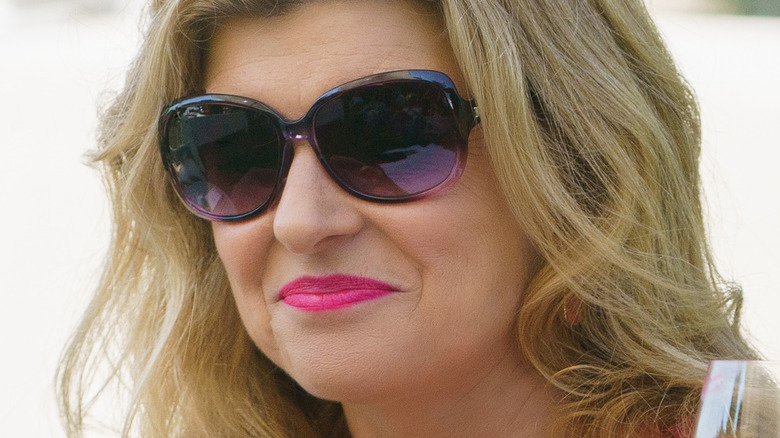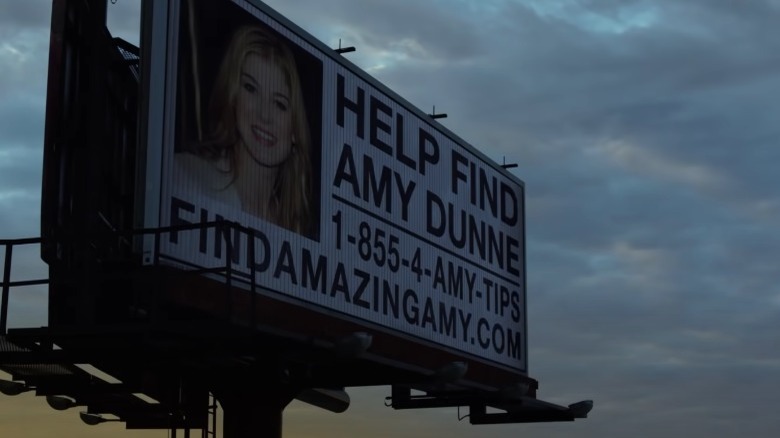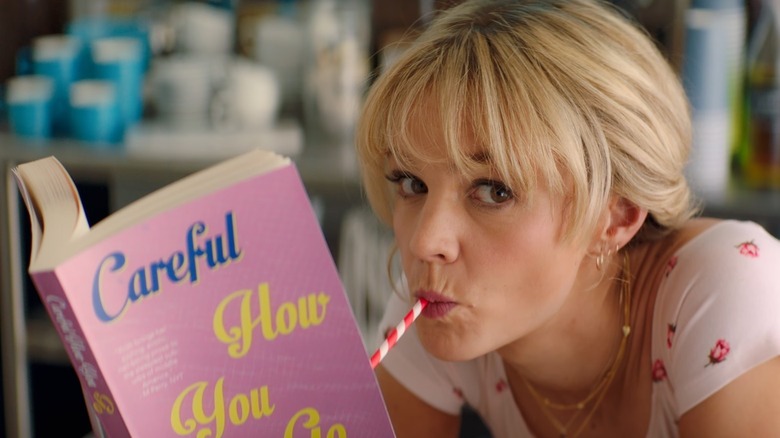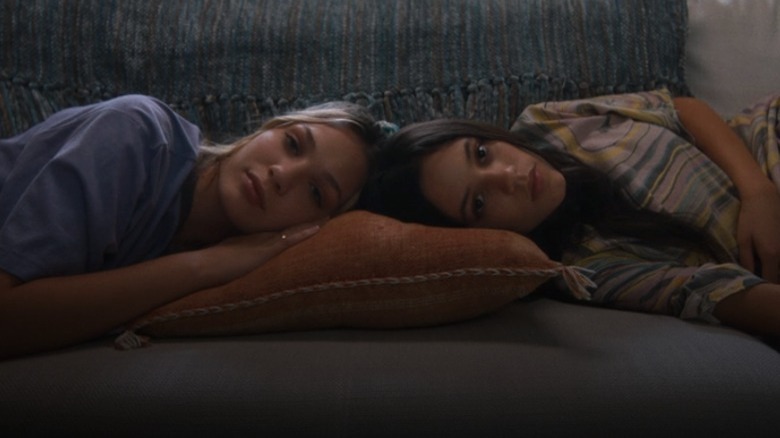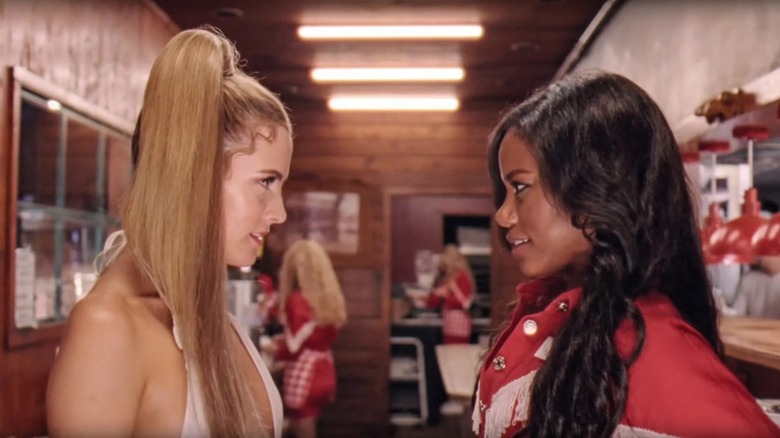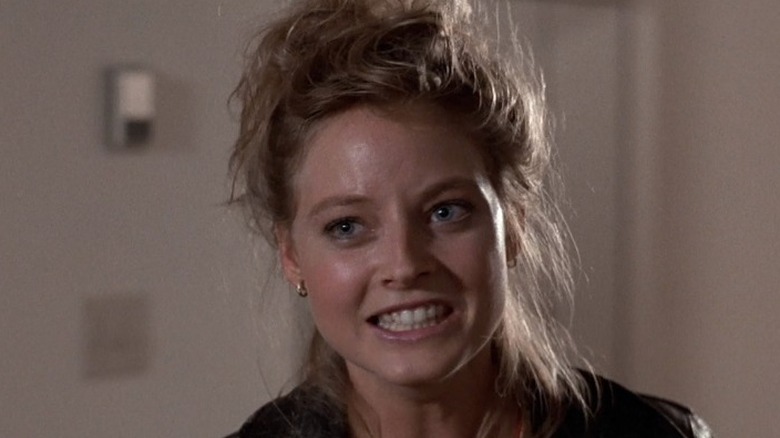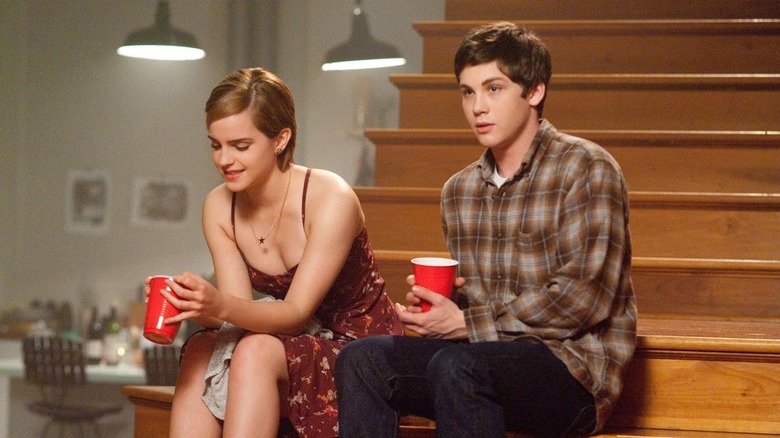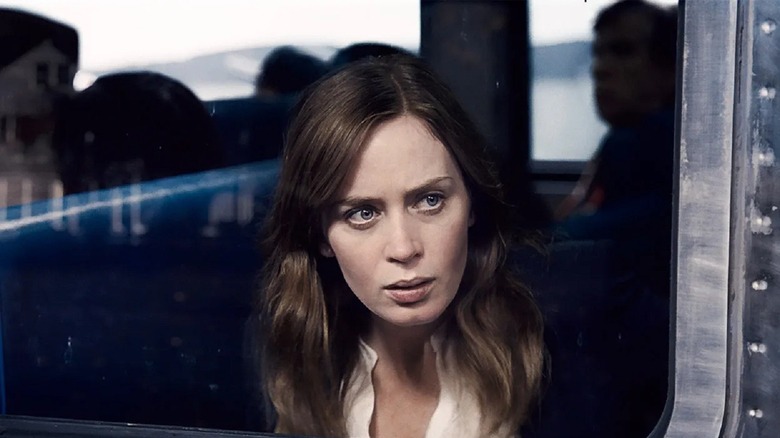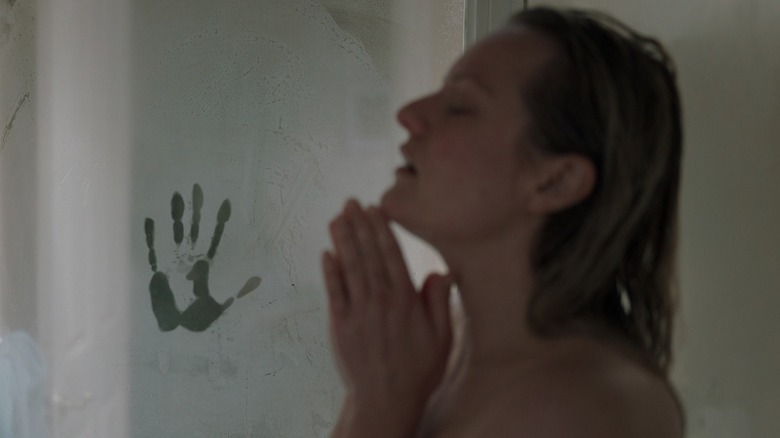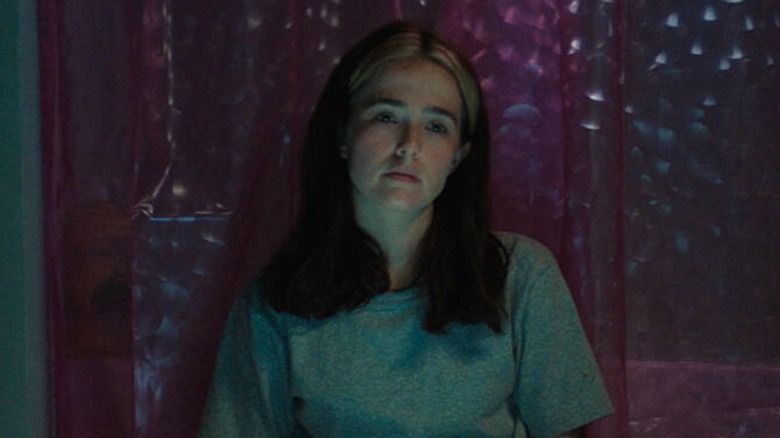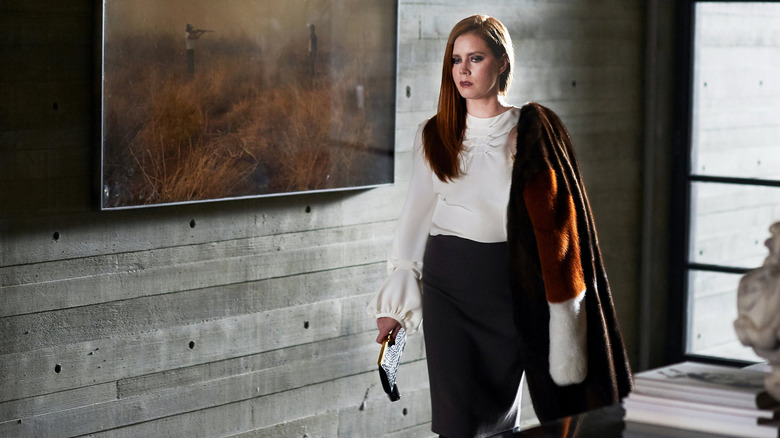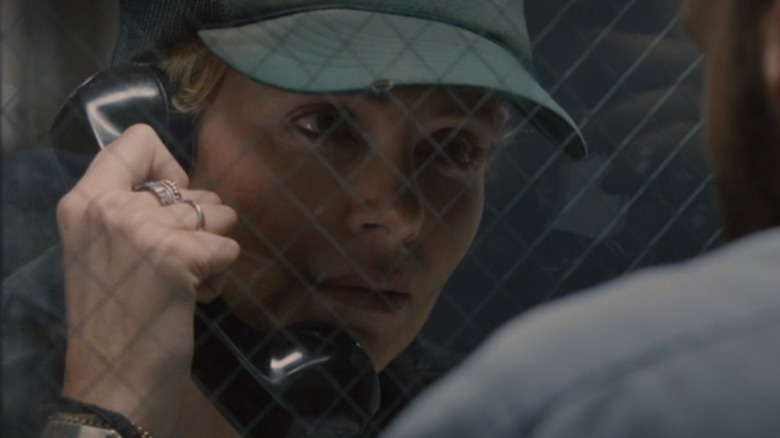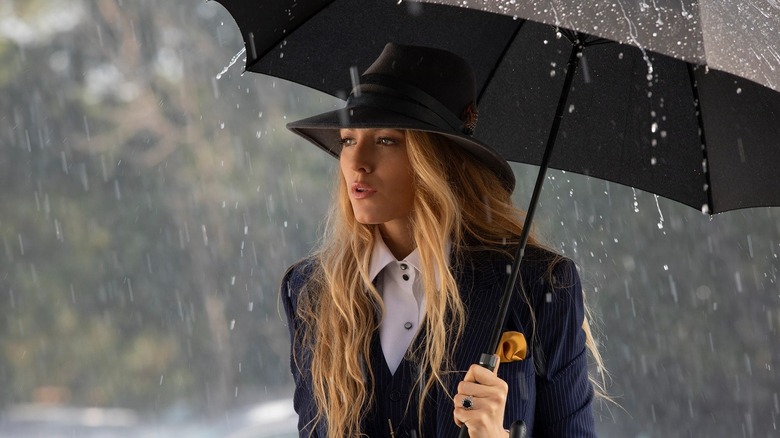12 Movies To Watch If You Loved Luckiest Girl Alive
The following article includes discussions of gun violence and sexual assault.
Imagine you've gone through a tragic event during your childhood that changes your life. Then, instead of being able to grieve this event and come together with the others involved, you're blamed for that event, labeled a social pariah, and forced to reinvent yourself. That's the reality for Ani FaNelli, the protagonist in Netflix's 2022 film "Luckiest Girl Alive." As a warning, this article will deal with several sensitive topics.
Ani goes through being assaulted by her boyfriend and two of her friends, and shortly after she is also accused by one of her attackers as being an accomplice in a school shooting that she not only didn't take part in, but actually stopped one of the shooters by killing him. She spends the rest of her life working to reinvent herself into the person she always wanted to be and is close to achieving this life — that is, until a documentary about the shooting at her school forces her to not only face her attacker, but to face the truth about her feelings toward her "perfect life."
The film, based on a book of the same name, deals with trauma, has graphic scenes, and is heartbreaking. At the same time, though, it delivers a powerhouse performance from Mila Kunis and creates a witty and sharp tone that combines comedic jabs with realistic feelings of trauma. For those who loved "Luckiest Girl Alive" and want to watch more films with similar themes and tone, here are 12 movie recommendations for you.
If you or anyone you know has been a victim of sexual assault, help is available. Visit the Rape, Abuse & Incest National Network website or contact RAINN's National Helpline at 1-800-656-HOPE (4673).4
If you have been impacted by incidents of mass violence, or are experiencing emotional distress related to incidents of mass violence, you can call or text Disaster Distress Helpline at 1-800-985-5990 for support.
Gone Girl
For another female protagonist with a bone to pick, David Fincher's "Gone Girl" is a great choice. The film, based on a book of the same name, follows Amy and Nick Dunne, a married couple who are seemingly perfect to those around them. Amy, a quiz writer for a magazine and Nick, also a New York-based writer, fall in love and get married. Nick eventually asks Amy to move back to Missouri with him to care for his parents, and she reluctantly agrees. However, five years into their marriage, when Amy turns out to be missing, their picture-perfect life begins to unravel one thread at a time.
The film, tonally, is a lot like "Luckiest Girl Alive." There is an overarching thriller feeling with the relief of dark comedy throughout. It also features a strong female protagonist who is sometimes morally gray but ultimately has endured so much trauma that it's understandable why they are the way they are. There are also themes of abuse and women empowerment. Most similarly, but still quite different, are the themes of reinventing yourself and questioning who you are without the guise of wanting that picture perfect life.
Promising Young Woman
Dealing with similar trauma themes is Emerald Fennell's "Promising Young Woman." The film follows Cassie, a woman who is cunning, brilliant, and seemingly normal — other than the fact that she spends her nights leading a double life as a vigilante. During the day, she works as a barista. At night, she goes to bars and lures men into trying to taking advantage of her so she can expose them and scare them. Cassie is haunted by the fact that she watched her best friend die by suicide after going through the trauma of being gang-raped. Cassie then makes it her mission to seek vengeance, and it consumes her life. Throughout the film, the audience is left wondering what will win out: Cassie's new relationship and promise of a less painful life, or her need for avenging her best friend's trauma.
"Promising Young Woman" features one of the best performances of all time from Carey Mulligan as Cassie and one of the best scripts and directing of all time from Emerald Fennell, who made her directorial debut with this film. It has similar instances of the trauma that Ani experienced, but it also has that grit of wanting to avenge a woman wronged — a grit that is so powerfully portrayed throughout the plot.
If you or anyone you know has been a victim of sexual assault, help is available. Visit the Rape, Abuse & Incest National Network website or contact RAINN's National Helpline at 1-800-656-HOPE (4673).
If you or anyone you know is having suicidal thoughts, please call the National Suicide Prevention Lifeline by dialing 988 or by calling 1-800-273-TALK (8255).
The Fallout
For another movie that addresses the pain of gun violence and young people working through trauma, Megan Park's "The Fallout." The film follows Vada and Mia, two high schoolers who are in the same stall hiding during a mass shooting at their high school. After they make it out alive, they work together to overcome their fears and work through their pain, developing an unlikely friendship in the process. While trying new things and enjoying time together, they must also both examine the way they see the world and how they can move forward.
Both films showcase the intense mental strain and damage that can result from gun violence — particularly for young people and in schools. In "Luckiest Girl Alive," Chiara Aurelia is Mila Kunis' younger version and delivers a strong performance in the face of so much real trauma. In "The Fallout," Jenna Ortega and Maddie Ziegler are tasked with portraying teenagers who face such hardships, and they both handle this task beautifully. It's a heartbreaking story to watch someone so young go through something so tragic, and you feel a similar way watching young Ani in "Luckiest Girl Alive" as you do watching Vada and Mia in "The Fallout."
If you have been impacted by incidents of mass violence, or are experiencing emotional distress related to incidents of mass violence, you can call or text Disaster Distress Helpline at 1-800-985-5990 for support.
Zola
A movie that deals with abuse and trafficking is Janicza Bravo's "Zola." The film is based on a viral story that unfolded via a thread of tweets. Zola is a waitress from Detroit who is also a stripper and gets coerced by her friend Stefani to go dance in Florida for the weekend with the promise that they'll likely make a lot of money. However, what was supposed to be a simple weekend of stripping turns into a huge mess of a journey when Stefani's boyfriend and her pimp get involved in the scenario. Zola ends up having to fight for her principles — and her life — all within the span of 48 hours.
"Zola" deals with shared trauma and violence like most of the other films, but it talks about it less from a mental health and trauma perspective and more from a realistic perspective as it's happening. Zola is in survival mode so she doesn't have time to deal with how it would affect her mental state. There's a slight tone shift in this film as it's a lot more life-threatening and chaotic than the others, but the biggest difference is that it tackles human trafficking in a very genuine way.
The Accused
For another movie dealing with similar trauma with a serious tone, Jonathan Kaplan's "The Accused" makes for a good watch. The film follows Sarah, a woman who gets into a fight with her boyfriend and goes out to drink her feelings. While out, she is assaulted by three men in a bar, and everyone who could have been witnesses to the crime start watching and cheering. Sarah then works with the district attorney, Kathryn, but justice is not received. Sarah and Kathryn then work together to successfully prosecute the men who raped her, and those who stood by silently.
Starring Jodie Foster and Kelly McGillis in altogether memorable performances, "The Accused" is graphic and hard to watch because of the trauma associated with it. However, for those who can make it through, it has powerful themes of post-traumatic stress disorder and victim blaming. But, most importantly, there's an overarching message of empowering women who feel they can't come forward because the lack of justice most women find when pursuing trial for their rape. It's an interesting deviation from "Luckiest Girl Alive," because where Ani didn't pursue criminal charges, Sarah did, so the audience can see how the legal aspect works when watching "The Accused."
If you or anyone you know has been a victim of sexual assault, help is available. Visit the Rape, Abuse & Incest National Network website or contact RAINN's National Helpline at 1-800-656-HOPE (4673).
The Perks of Being a Wallflower
Another movie with a similar tone, but which is more of a coming of age story, is Stephen Chbosky's "The Perks of Being a Wallflower." The film follows Charlie, a social outcast who is entering high school with no friends, and his own sister won't even talk to him. As he navigates his freshman year, he turns to writing letters to someone he calls "friend" as an outlet for his emotions and uses that as his only friend — that is, until Charlie meets Sam and Patrick. The two seniors and step-siblings take Charlie under their wing and help him get through his emotional struggles and lonely days at school, all the while not realizing how much Charlie helps them get through both of their own trauma.
Though the story focuses a lot on mental health, it's mostly about the bond formed by these three teens who have all faced hardships but are learning to cope and create a better life for themselves without letting their trauma define them. More than that, like Ani, Charlie finds solace in writing his feelings, which they both didn't expect they would. Most of the other films feature female empowerment, but this film centers more around teenage empowerment and learning to work through mental illness at a young age. (Warning: The film does contain scenes of sexual abuse of a minor.)
If you or someone you know may be the victim of child abuse, please contact the Childhelp National Child Abuse Hotline at 1-800-4-A-Child (1-800-422-4453) or contact their live chat services.
The Girl on the Train
Another film that is tonally similar to "Luckiest Girl Alive" is Tate Taylor's "The Girl on the Train." Based on a book of the same name, "The Girl on the Train" follows Rachel, a woman who turned to alcohol to mask and cope with her trauma. After losing her job and getting divorced from her husband, she spends each day riding the train into New York City and wondering what her ex-husband and his new wife are doing, as well as their neighbors. The wife of the neighbor couple, Megan, was the nanny to Rachel's ex-husband's new baby, but recently left. Merely catching minor frames of the family from the train, Rachel one day finds something out of the ordinary. Once she learns Megan has gone missing and is thought to be dead, Rachel begins investigating the situation on her own — but will she find out the truth before the cops suspect her own involvement in the crime?
There are very similar themes of reckoning in both "Luckiest Girl Alive" and "The Girl on the Train." Both films have a psychologically thrilling component that keeps you engaged and guessing, and both films feature a troubled female protagonist.
If you or anyone you know needs help with addiction issues, help is available. Visit the Substance Abuse and Mental Health Services Administration website or contact SAMHSA's National Helpline at 1-800-662-HELP (4357).
The Invisible Man
For another film about a female protagonist who fights to survive, fans should watch Leigh Whannell's "The Invisible Man." The film follows Cecilia, a woman who has just recently escaped the her abusive scientist husband, Adrian, who then fakes his own death. Soon after, Cecilia begins being tormented by an invisible presence, one who psychologically and physically abuses her. However, when she tries to tell her story to the police and even to her friends, they don't believe her. Cecelia is left to handle the situation on her own, and fight to prove not only Adrian's crime, but to save her own life from his terror.
For much of "Luckiest Girl Alive," Ani is very lonely in her pursuit of justice, trying to not come across as delirious to her loved ones. Cecilia goes through this same plight in "The Invisible Man," as she tries to turn to the police, her sister, and her friend for help, but all of them are put in danger and/or don't believe her. In both films, there are also many themes of abuse and women figuring out how to handle the situation in a way that exacts justice and saves their lives from the torment of reliving this trauma.
If you or someone you know is dealing with domestic abuse, you can call the National Domestic Violence Hotline at 1−800−799−7233. You can also find more information, resources, and support at their website.
Not Okay
Another film featuring some modern themes about facing trauma like "Luckiest Girl Alive" is Quinn Shephard's "Not Okay." The film follows Danni, a young woman working at a magazine as a designer who is dissatisfied with her life and feeling lonely. Desperate for attention from her co-workers, and a handsome one in particular, Danni fakes a trip to Paris for a writer's workshop. All is going well, and people are believing it, until a mass bombing happens mere feet away from where Danni made her last post. Instead of coming clean, she decides to run with the idea that she was a victim of this bombing and uses her trauma to gain more followers and make connections with people. But how long can Danni keep up the act before the truth comes back to haunt her?
Like Ani, Danni uses writing as a way to cope with her trauma. True, the trauma is fake, but it's a place of solace for her. Both Ani and Danni work at hip magazines in New York City, and both women struggle with who they really are outside of the persona they've created. The films also both deal with weaponized violence, as well as youth gun violence, and how people deal with the trauma that comes with it.
If you have been impacted by incidents of mass violence, or are experiencing emotional distress related to incidents of mass violence, you can call or text Disaster Distress Helpline at 1-800-985-5990 for support.
Nocturnal Animals
Another mysterious thriller that unfolds cleverly throughout the film is Tom Ford's "Nocturnal Animals." The film follows Susan, the owner of an art gallery in Los Angeles, whose husband is constantly traveling and putting a damper on their marriage. When her husband leaves town, Susan receives a manuscript written by her first husband, whom she divorced from and hasn't heard from in years. Susan begins to read the story, which follows a family trip that turns into something much worse, and as she does, she realizes there are eerie similarities between the manuscript and her past. The more she reads, the more she's forced to relive and confront the dark realities of her past.
The tone of the film is perfect for those who enjoyed "Luckiest Girl Alive," as it drags audience members through tough past traumas and how to work through them in the form of writing many years later. It's gritty and intense, leaving audiences to be strung along as we watch Susan uncover the sinister truth. Amy Adams is a powerhouse and delivers an intense performance. However, all of the performances and the production are entirely brilliant.
Dark Places
For another movie about facing the truth of trauma years later, Gilles Paquet-Brenner's "Dark Places" is a good watch. Based on a novel of the same name, the film follows Libby, the only survivor of her family who was massacred when she was eight years old. She tells the police that her brother was the one who did it, after the police give her little choice to say otherwise. She spends her entire life living on donations from people who felt sorry for her. But when those donations run out, she is forced to appear at a true crime club to answer questions for money. While mentally revisiting her past, Libby must grapple with the idea that she may have blamed the wrong person, and her brother is possibly innocent.
Libby, played by Charlize Theron, survived something horrible that she can't seem to move on from. Similarly to Ani, both women are forced to later confront their traumas in the guise of benefiting true crime storytelling. The film is a mystery with thrilling elements and unfolds the story in a clever way, and just like "Luckiest Girl Alive," you're kept waiting until the last minute to see what the character's fate holds.
A Simple Favor
Last, but certainly not least, is Paul Feig's "A Simple Favor," which tonally and production aligns with "Luckiest Girl Alive." The film follows Stephanie, a mother, who is by all accounts, very wholesome and runs her own mommy blog where she posts videos of recipes and other advice for mothers. Stephanie's life is turned upside down when she meets Emily, a gorgeous, show-stopping mother of a boy in Stephanie's son's class. She is immediately drawn to Emily, and the two become fast friends. However, when Emily mysteriously goes missing, Stephanie decides to conduct her own investigation and digs into her past to discover the whereabouts of her elusive friend. What Stephanie doesn't realize is, Emily might not be who she says she is.
The film is quippy, beautifully shot, and features two strong female protagonists that both have their own traumas and issues to work through. The audience watches as Stephanie and Emily become victims of the world's horrors, and also friends who seem to be only able to relate to each other. There are themes of violence that also find similarities with Ani's trauma, but mostly just in the way the women choose to handle their pain. It's mysterious and, like "Luckiest Girl Alive," bounces back and forth between flashbacks and present day to cleverly unfold the story. Just like most of the thrillers on this list, audiences will be waiting until the last minute to figure out the truth.
